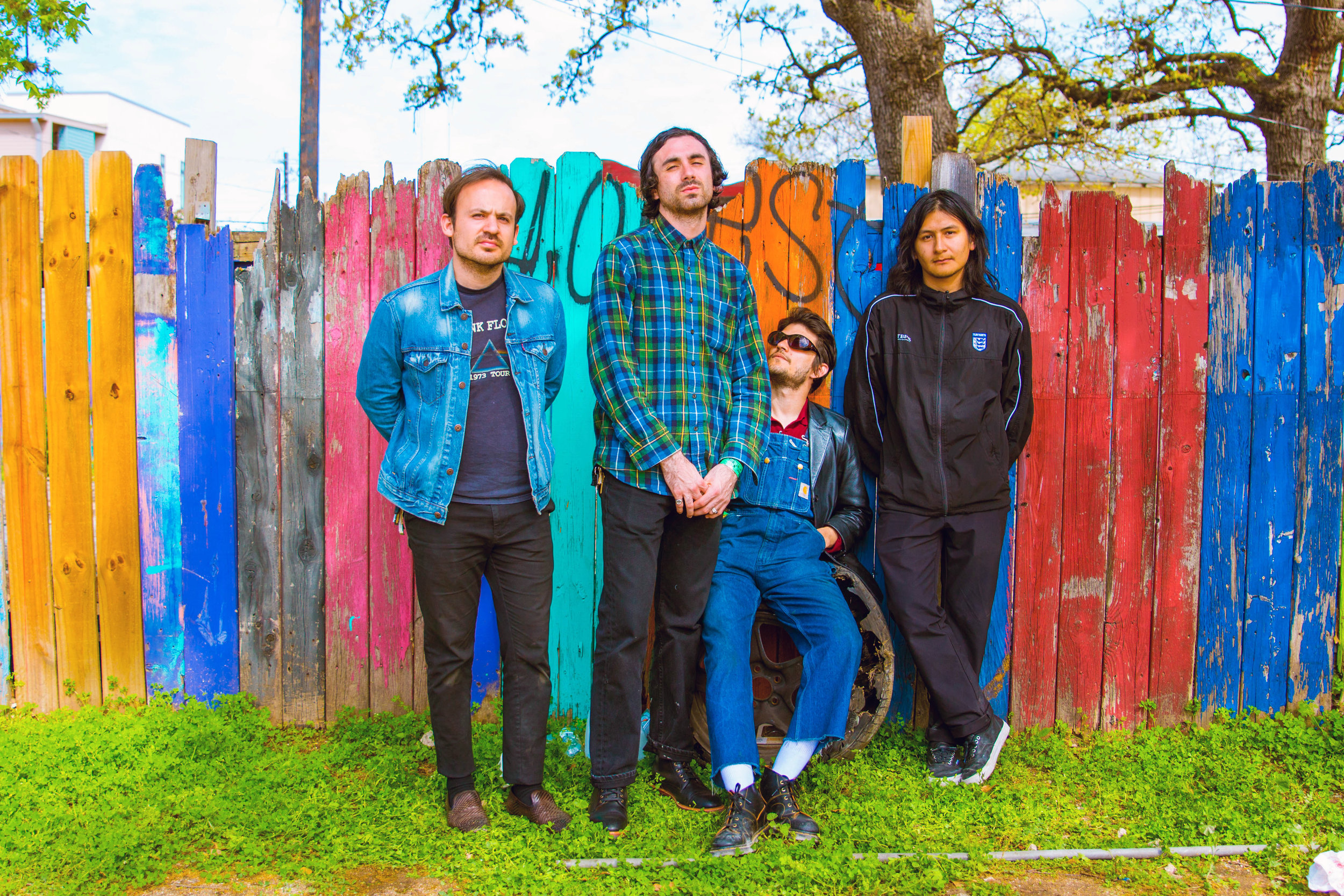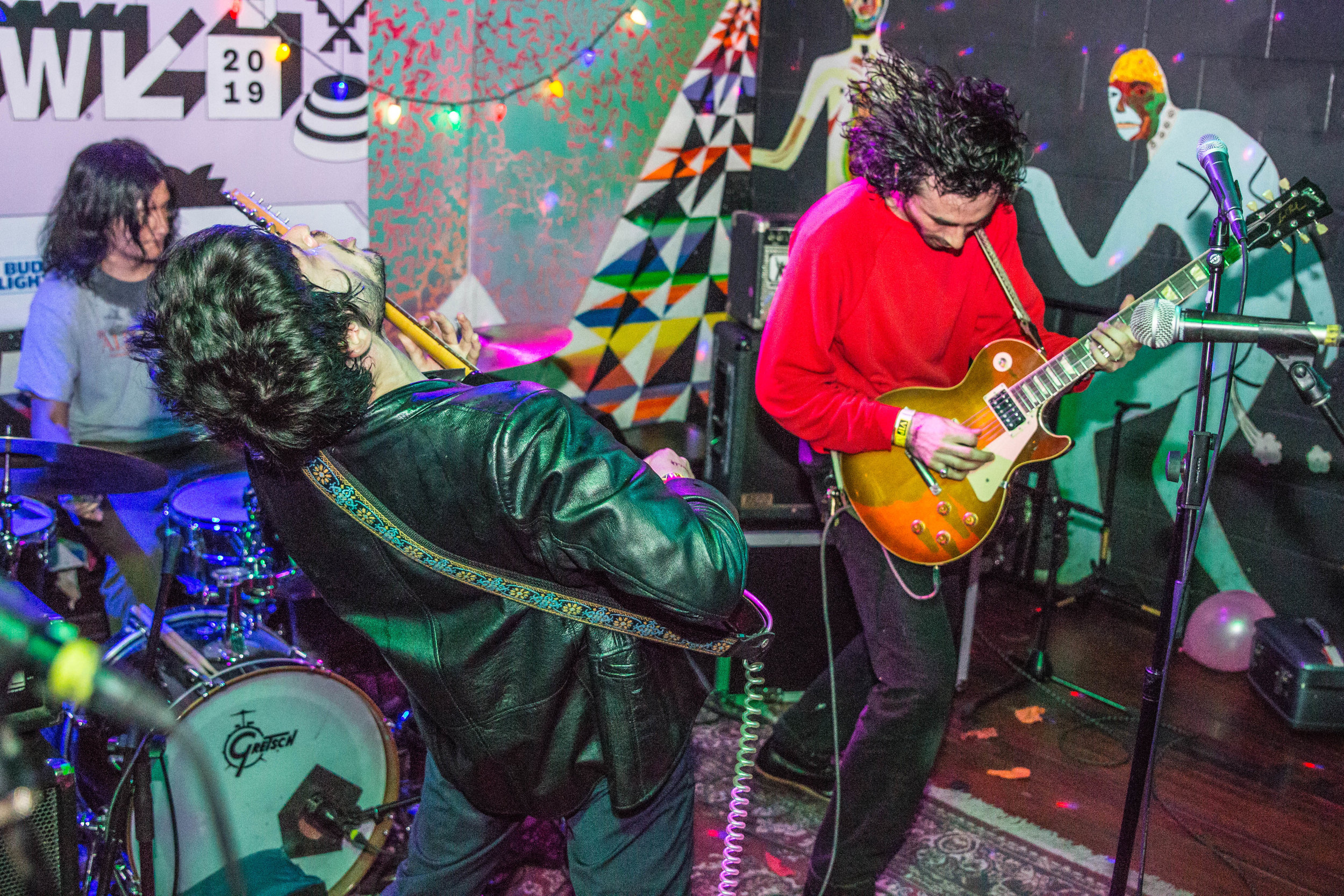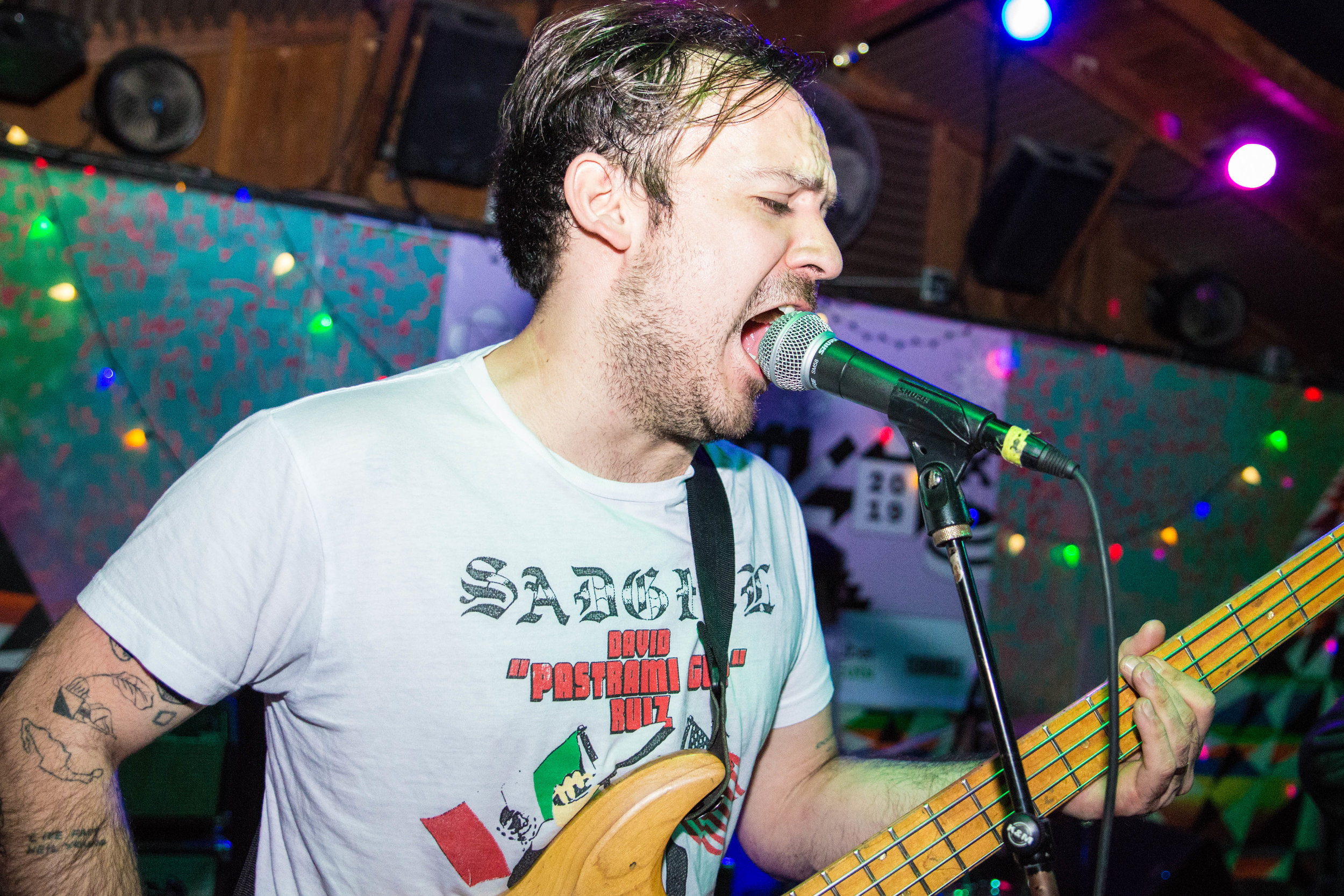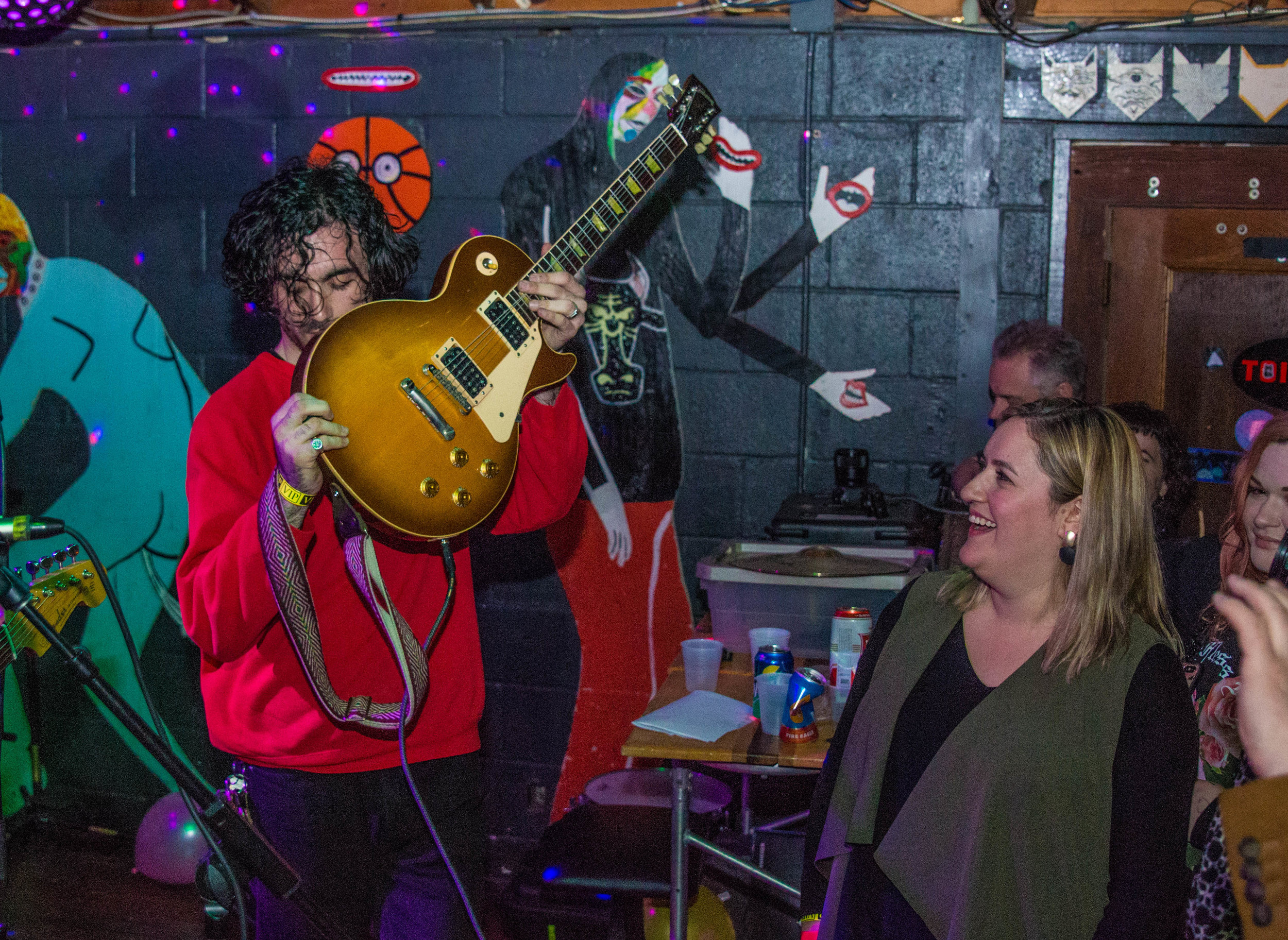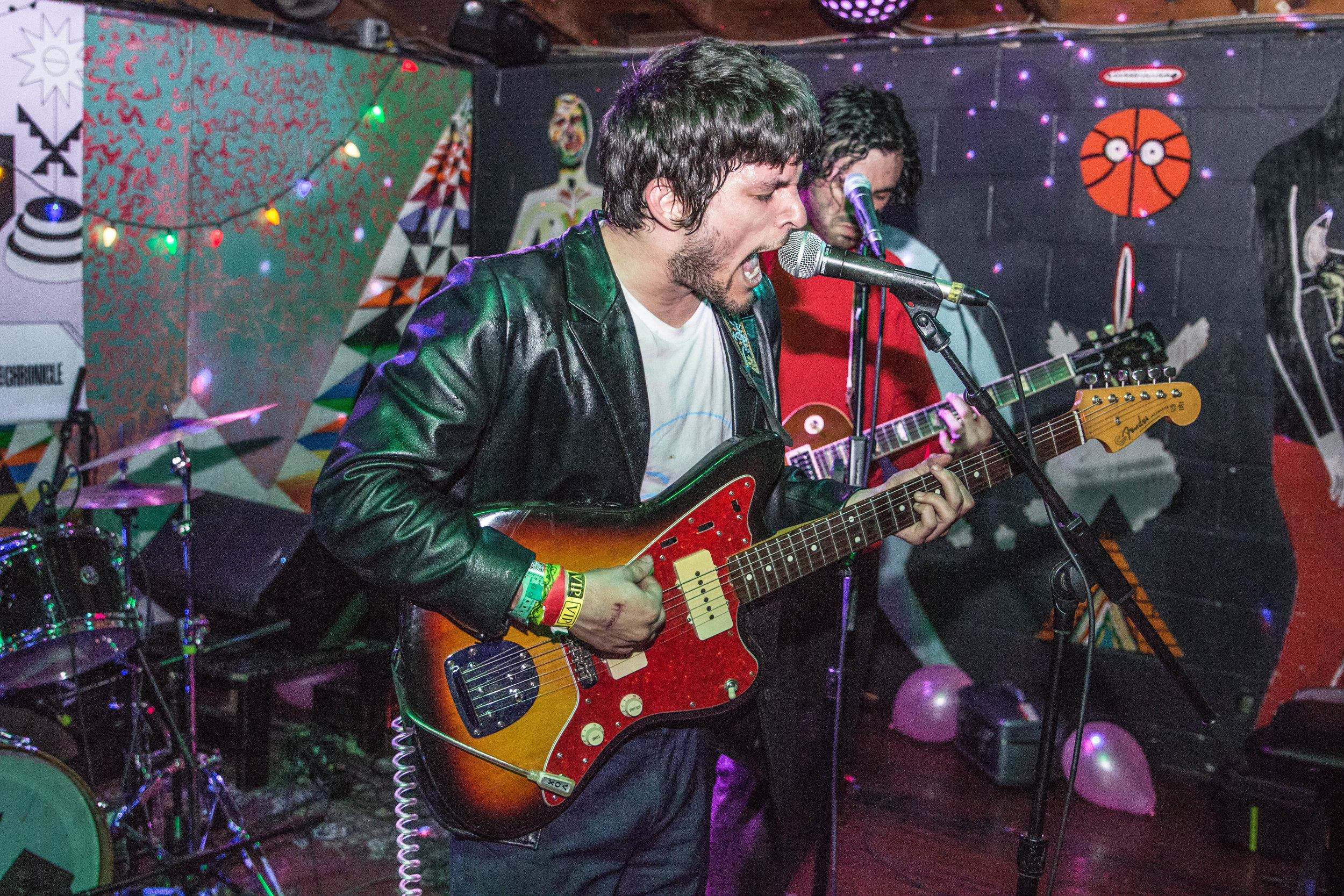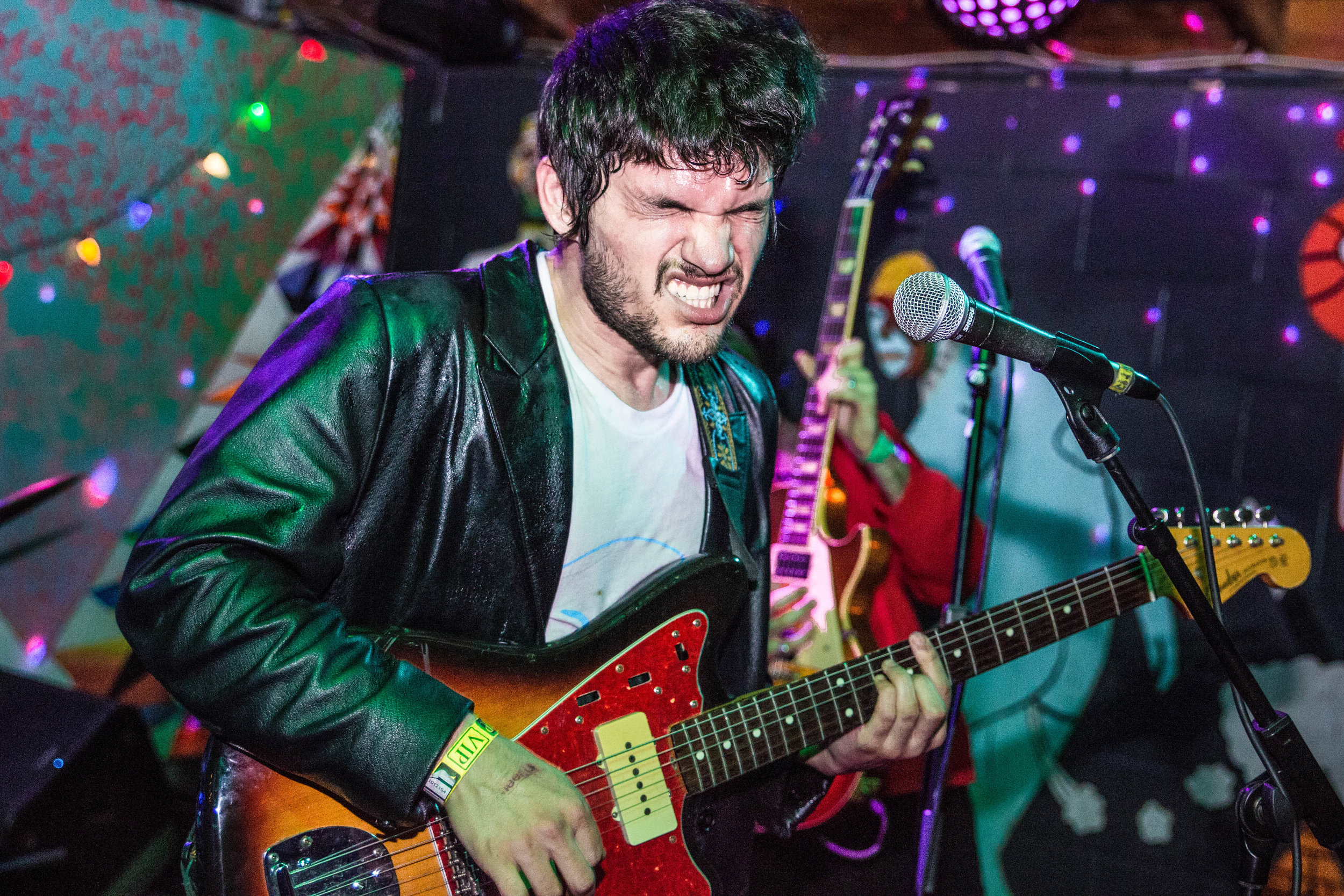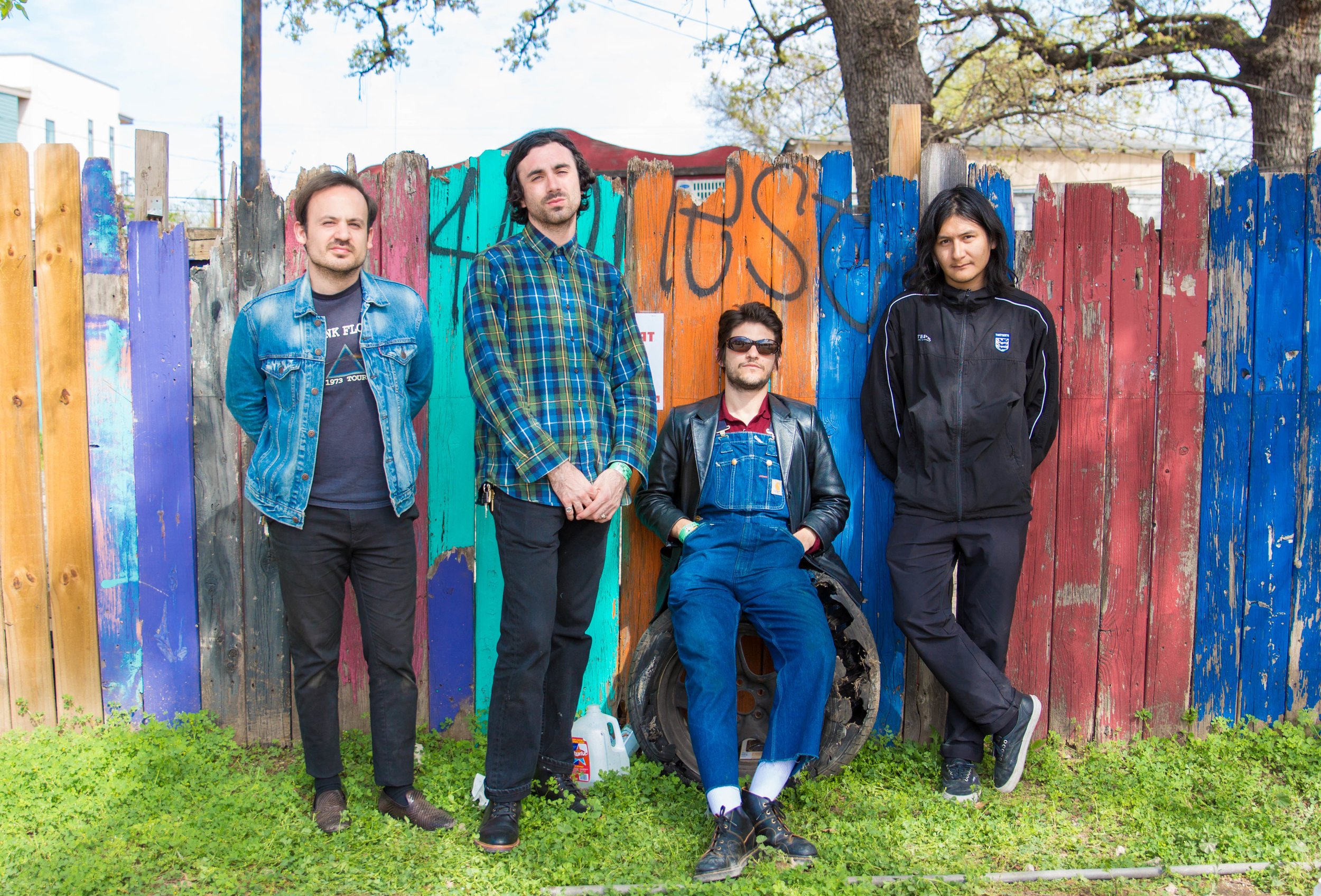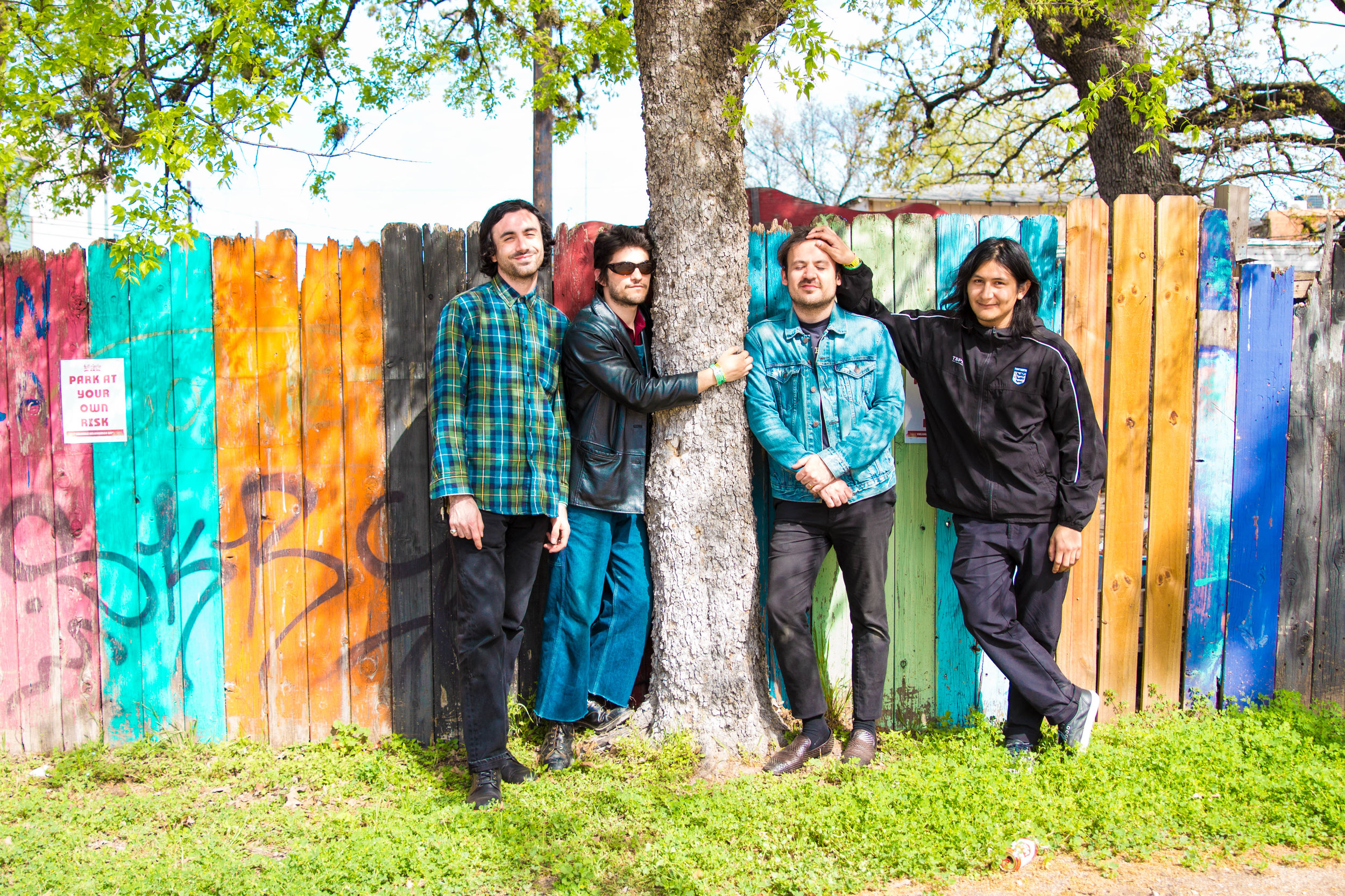A Chat With: Gustaf
Gustaf is a band founded on equal parts persistence and hard work, with a touch of happenstance thrown in there. The group had an impromptu inception in 2018, when Tarra Thiessen requested Lydia Gammill’s assistance to drive her van down from New York City to SXSW Festival for a tour with a different band that ended up not working out. Rather than cancel the trip, Gammill and Thiessen pulled together a new group of musicians to perform in lieu of the other project— and the rest was history. Since then, Gammill, Thiessen and their bandmates Tine Hill, Vram Kherlopian, and Melissa Lucciola have taken nearly every opportunity they’ve had to keep playing music as Gustaf, and they’ve garnered quite the reputation for their cathartic and intense live shows.
During their first two years as a band, Gustaf hadn’t released any recorded music, but they saw continued success thanks to word of mouth and their eagerness to put on incredible performances in a variety of spaces. This year, the band has graced the world with a tangible audio debut in the form of their first record, entitled Audio Drag For Ego Slobs. Released on Friday, October 1st, the debut album showcases a mix of art punk mayhem and an edge of playful performance art that they’ve become known and loved for. In celebration of the album release and Gustaf’s upcoming tour, ANCHR recently chatted with Lydia Gammill. Tune in below to hear about the series of fortunate events Gustaf has experienced, their favorite thing about the NYC music scene, who they’d love to collaborate with in the future, and more.
Photo by Juan Blanco Garcia. Gustaf is Lydia Gammill, Tine Hill, Melissa Lucciola, Vram Kherlopian, and Tarra Thiessen
ANCHR Magazine: Kicking things off, when you got into making music, what was your biggest inspiration for starting to create and write music?
Lydia Gammill: It’s kind of a dorky story. I was a teenager growing up in a preppy part of Massachusetts— this was a pre-Spotify era—and I was desperately looking for some sort of subculture or underground. I was illegally downloading songs off of Myspace, trying to find a local scene. I was a Harry Potter fan at the time, and my friend was like “Oh my gosh, this band Harry and the Potters, let’s go see them!” They would have all ages shows, so I went to one with her. This local band opened up for them and I remember sort of going to shows and watching them and being like “huh, they have a band, and they’re writing music… I think I can write songs!” My friend Casey was the one who dragged me to the show and we started this little band in high school called World Jump Day. World Jump Day is this hippie-dippie physics theory that if you got everyone in the world to jump at the same time, it might change the gravitational force of the Earth so it’s a little bit further away from the sun, to prevent global warming. So some of the first shows I was going to are these Harry and the Potter shows, and this place in Harvard Square would have open mic nights every Tuesday and I’d go and watch people. I kind of had to see someone else going for it, and be like I think I can do that! I’d always sung and acted, but I got a guitar for Christmas when I was like 15, then my twin brother got an electric guitar and I started playing his. I think when you’re starting out playing music and playing other people’s songs, you don’t think you’re allowed to write songs. Like you think there has to be some sort of fanfare or class that you’re supposed to take to be allowed to make the thing, and that realization was really fun and empowering to be like there’s no rules, you can just do it. I think when you’re a young struggling artist, hearing that advice is really frustrating because it’s like but how? I think 15 years later, I know that is what you have to do. You have to try it and not worry about the consequences. It’s easy to think something’s supposed to be perfect and fully formed before you do it, but the harsh truth is that rarely is that the case. You just learn by making more stuff.
Yeah exactly, it’s the “fake it til you make it” approach.
Yeah there’s a famous study with pottery and I think paper airplanes— Where they take two groups of students, and one group is like to make the best paper airplane or the best clay pot, and the other group is just asked to do as many as they can. It’s always the quantity group that ends up having the best products. I’ve also heard that other studies say the amount of effort to make something really good, starting out if you’re putting more effort in, it will be better. However, with the completion of each thing, you at first will start with a lower quality with the quantity method, but every time you complete something, it makes your starting point for the next thing that much easier. So you get better and faster over time.
Yeah that makes sense because you have more practice doing it, so it will get better over time.
There’s something to be said about learning more and more each time you do something. But sometimes I don’t always follow that advice.
Yeah I understand that, that struggle of revising too much. Speaking of creating, congratulations on finishing the debut album! Can you talk a little bit about your creative process with writing these songs and collaborating with the band?
The whole band started because Tarra had a van she had to get down to SXSW. She was going to take it down for another tour that ended up falling through, so she asked me if I wanted to help her drive. I was like, is there a way I could play shows on the way down? I was playing in some other bands at the time, but I was trying to do my own thing. We took the rhythm section from the band that was going to use the van at SXSW, we took the drummer and the bassist, and Tarra’s boyfriend was along for the ride so we threw him in there, and we had Tarra on vocals and percussion. We just had to hit the ground running, so we ended up having shows booked before we had a name or before we practiced. The first get together of the original line up was taking photos in Tarra’s apartment. I’d had a couple of solo projects and mostly played in bands the first 7-10 years of my musical life in Brooklyn. It was hard to keep momentum with that and getting everyone together. It’s a weird pressure being in charge, but with Gustaf, I didn’t really have time to second guess or overthink. We just had to make it work right then. So I had to send people my demos, make a Facebook and Instagram account. We had to put it out there in a way that I hadn’t necessarily done with anything before that, and that kind of method ended up being a driving force of the first couple of years. We played live for two years before the pandemic, and it ended up being an important part of our start and how we ended up being able to put the car in neutral and shove it down the hill to get it going.
That’s great, it sounds like it was all a right place-right time scenario.
I also was working as the booker upstairs at Piano’s, which is a place in New York. That was a really hard room to book, I just had a lot of people be like “We’d love to play, but I don’t think we’re ready,” and I just remember being so frustrated with them being like “You’ll figure it out! Just say yes to the show.” So having that experience and this band coming together so quickly, and just seeing that you could start with a nugget of something and figure it out on stage, and kind of not thinking and doing as much as you can. Pretty much after that first tour, anyone who asked us to play a show, I would just say yes to it. If the original members couldn’t play, we’d get random friends to fill in. It was a fun and exploratory experience where every show was unique and different. We were just having fun and figuring it out, and trusting that you can make magic happen from whatever is there. My rule for Gustaf is that there’s no mistakes, only new arrangements. That’s the fun part of the live show, there wasn’t always a strict arrangement to begin with, and we were always approaching each show as its own little thing. We would just go with whatever was happening. Also, I did some improv comedy in my early 20s, which I wasn’t very good at, but that was another important lesson in learning how to be comfortable and confident with things going well or not going well onstage. Looking back, it’s little bricks that lead to this.
With the music, the songs that I wrote to get us started, I was focused on getting out of my head. I would usually make a drum loop and then find one bass line that I thought was interesting and sustaining, and then I’d do a second bass line on top of that and do some vocals. From there, the band just kind of elaborated and wrote their own parts. Now, for the second album that we’re going to start working on after this one comes out, some of the stuff we have been writing together. It’s more of a mixed approach. We also took a long time to figure out how we wanted to make this record because I wanted the first thing we put out to sound good and make a good impact, but it was hard to figure out what we’d developed onstage and what of that we wanted to keep, and what we wanted to expand upon. Music is different in a live environment than in the studio environment, so it definitely took a couple of tries just figuring out what recording method would work best for us. I have to thank the band for their patience and perseverance. We’d be on tour and we’d be like let’s get into a studio for a day and see what the set sounds like now, just as it is. You can’t really finish a record that way, so it wasn’t until we got our record deal right as the pandemic hit— Then we had pretty much a year to figure out how we wanted to record and make our formal introduction into the world of solid sounds, not just the ephemeral whiplash we were doing onstage before.
Yeah I love how there’s that improv aspect to it with performing it live, versus when recording you have to decide how you want the songs to live on.
Yeah that’s a “me problem”, too. I really love doing things differently every single time, and I realize that part of me is a little bit different than the world of recording artists and musicians who are used to being like no, we set the part, we’re going to do it that way and repeat it that way forever. Then you record it that way. I can get easily distracted, or every time I try to find a new exploration of sound. Which is fun as a performer, but when you sit down with a bunch of different takes, it’s a lot to comb through. So making these decisions earlier on will be a bigger part of the next album. Also, another part that’s difficult about the recording process, as a band in NY, as opposed to another scene, we all have backlines here so you don’t have to bring a lot of gear to a show unless you’re very specific about your sound. We travel light, and as much as we can, we’re very scrappy when we travel. Whatever we had, we would use, just so we don’t have to lug a bunch of stuff around. So we didn’t necessarily have those moments of being like this is our sound! We were always bending and being very malleable to the situation that we were in, and letting that influence how we were going to do the sonic arrangement. Also when it comes down to making the decision of how do we want the bass drum to sound, how do we want the vocal references to be, etc..those are a lot of questions we hadn’t ever set in stone. It was a fun exploration.
Yeah, it sounds like you could really work with whatever you have available. You know you’re truly creative when you can work with what you’ve got in front of you.
Yeah I find that very inspiring too. I like using what’s in my fridge to make something. Those types of boundaries...especially for me as someone who overthinks so many possibilities, having a limited palette to make a meal or make a song with, that’s very fun and freeing because you can blow out that limited option. To see how much you can expand upon a very small amount of things, is a fun exercise, whereas if you have everything at your fingertips, there’s choice fatigue.
Yeah there’s that Paradox of Choice that comes into play.
I had a German friend staying with me once and she went to the grocery store and she was like “I just looked at all your cereal, you have so many cereals here!” We like choice here.
Yeah it can be daunting to have so many decisions. So circling back on the New York scene, I was going to ask what your favorite aspect about it is at the moment. Is it the fact that there’s a lot of backline?
100% that there is a backline! We’ve done tours in a minivan with five of us, and there’s no way we’re putting drums in there. So we’ve gotten very good at asking the local bands to borrow their drum set. One time we played in Houston and we were booked with an electronic act, so magical Tine knew someone in Houston who had a drum kit we could borrow, and then we showed up and we didn’t have any amps because we were flying and couldn’t have much gear. We ended up DI-ing everything, and we just had a drum kit on stage. The New York scene is great because there’s a lot happening here and it’s very expansive. You can just go to shows and hang out, and it might not feel like it, but if you look back after a year, you end up meeting a lot of people. Those connections help you get shows and get your foot in the door. There’s a lot to be said about hanging out and getting to know people. We didn’t have any recorded music until last year, but we were able to play a lot of shows in NY and outside of NY because we’ve all been musicians in the scene for the last 10 years or so and we know people. Then if you play good sets and people like you, they book you again. It’s all of those personal relationships that we’ve built up that helped us thrive while we were still figuring out how we wanted to package ourselves in the permanent realm.
Yeah that’s awesome. I remember I was talking to Native Sun a while back and they mentioned Gustaf as a band in the NYC scene they liked, but you didn’t have music out then so I couldn’t experience your sound yet.
We still have only played a couple of shows with music out! I’m very excited about our tour now that we have music out because before, we just had to tell people to trust us to come to our show.
I read in another interview you did that “Audio Drag” is a concept that you took from Laurie Anderson. Gustaf now uses the tagline and named the debut album Audio Drag for Ego Slobs. Can you elaborate more on that concept and what it means in your performance?
That came from the early days of Gustaf when I was sitting down and thinking about what I wanted the project to be, and working within boundaries is something that’s comforting. Having some sort of umbrella thought that things could fall under helped shape at least the theoretical world that the lyrics would live in. I wanted something that was kind of cathartic and fun, but a little funny, and I would define an ego slob as someone who does a bad job of translating the outside world within the context of themselves. I liked the idea of having songs that have this indignant and sloppy narrator or character, and just someone whose hysterics are kind of funny in a way. You know when someone’s freaking out in a movie, but it’s a little bit funny? Our strong peaks of emotions feel very intense to us, but if you step back, we’re all kind of a little bit ridiculous. I think it was a universal feeling of someone feeling like they are right, and someone’s wrong-- When in reality the person they think is wrong, thinks they’re right. So just trying to expand on those views. The songs are supposed to be from the perspective of someone who is having trouble processing their emotions and their relationships with other people, rather than an emotionally mature point of view.
Yeah I was going to say in listening to the album, there’s definitely a theatrical element and that spoken word aspect in your delivery as well.
The pandemic kind of made the joke a little less funny, if that makes sense. Because we really are seeing people dealing with emotional extremity and intense stuff, so the idea of someone being a selfish jerk was a little less wholesomely funny in a way. So I did add that last song [“Happy”] during the pandemic. That reveals more of the sensitivities of someone, and we just want the best for everybody and that’s the most you can do. I like the idea of the “hurt brute” or the “sensitive brute.”
Yeah and sometimes all you can do is laugh through the hard times, so it’s good you can still kind of bring that humor in play during these times!
The music video for “The Motions” was recently released, can you talk a little bit about that artistic direction behind it? I really liked the cinematography of it.
Yeah that was great! For the music videos for this album cycle, there’s definitely a small thread that I wanted to be tied through all of them. So there was the process of an ego slob reprogramed. “The Motions” is a rip on the motions we go through every day, and I thought of it as someone having their inner monologue and set of rules to try to keep them on track as they go through their life, but not being able to suppress the hysteria inside. The director Araque Blanco is here doing a graduate program, and he’s from Spain. He’s done a lot of bigger productions over there. He DM’d the band, and we needed someone for the videos. I’ve been very lucky when I’ve needed someone, they end up coming to me— I’m not one to reject the offerings of life. We met up and I told him I had an idea for there to be this dance part of it with the band, and it’s about trying to do the thing or follow the rules that are set in front of you. I talked to him about this concept, and he took that and ran from there. He really is into great art design and costume, so that was fun to work with someone who has a specific aesthetic that they like. The cinematographer, Cory Fraiman-Lott, Araque actually found him on Instagram, and he has this great camera that he’s using for a feature this Fall. It all lined up that he had access to this camera and we could make it work. There were a lot of happy accidents. Also, Cory I found out on set that he’s really good friends with both of my cousins. The world is just so connected. Araque really killed it with the video though, he listened to my ideas, but was also great at taking them and elevating them with his own spin on them. His friend did all the styling. We sent her a bunch of pictures of all our clothes and she came and put stuff together. We shot at a park in Rockaway and Staten Island on two very hot days with a lot of ticks running around. I was worried about making sure the band was okay and comfortable and not getting heat stroke or being bitten by bugs. It was one of those moments where we were really tired and working through it, and I was looking around like well, this is me living my dreams, this is me in paradise! It’s very hot, people are stressed out, but I’m living the dream! I’m someone who loves that stuff, but I want better for people than I want for myself, if that makes sense. So I was like “Is everyone ok? Does anyone need water? Is everyone full?”
That’s great how everything came together with happenstance for the music video. That seems to be an ongoing theme for the Gustaf project, with starting due to the SXSW trip and up until now!
Yeah a lot of trust and going for it! It’s like fear is your friend, but you can’t let it stop you from anything.
Yeah, be fueled by the fear. Then as far as the recording process, I understand it was done in Honey Jar Studio in Brooklyn with Carlos Hernandez, and you co-produced? Can you talk about that experience and working with Carlos?
My friend Chris who has this great band Nicholas Nicholas and works as a producer, I kept telling him I needed someone to produce this record, and he recommended Carlos and Julian [Fader] from Ava Luna. He was like they’re great, you should work with them and I was like yeah, I don’t know...and I spent another year and a half talking to a lot of people and then finally contacted Carlos again. We did the first two singles with Chris Coady in LA, which was a lot of fun. He’s such a top tier producer—he had a drum tech come in and set up the drums, there were so many microphones… For us, being scrappy people, we were like this is very nice and pro. I think for how I like to work, or how I’ve thought about this before, I definitely wanted for the album to be a little more present in the room. I like exploring every single option and figuring out how we do the best way for this and that.
For this first big project I wanted to figure out a way to be a part of the process, and Carlos is a really great and talented guy, but he’s also super wonderful in terms of working with me and sort of letting me be there for the process as well. So we could make a lot of the decisions together, which was really rewarding and not something you get with a lot of producers as well. He also works in Logic, which is what I like to demo in, so I wanted to work with someone using Logic where I could see how they like to do things and learn that way. We recorded in a couple of different bursts with the full band. We did all the initial tracking, then Carlos and I would clean stuff up, then the band came in again a month or two later to do a lot of different overdubs and stuff like that. Then we cleaned that up, and finalized the vocal takes. In terms of the band too, there was a lot of that fun, expansive sessions where we’d come, we’d lay a lot of stuff down and refine. We’d send it to everyone, get their feedback...It was a lot of sort of dumping and then cleaning, which I think was a fun way to figure out how to capture some of the lightning, while also adding a little bit more of that production element to it.
I’m sure that will help with that process for the next album, getting that working collaboration with the band going forward.
Yeah, and everyone is just so talented and has so much to offer, so I’m really lucky to have such great writers and collaborators in the project so that we can all kind of bring what it is that we do well to it. I think if anything it will get easier in the right ways as we go along.
For the upcoming tour with Idles, is there anything in particular you’re looking forward to or anything you can tease about your set?
I’m just so excited to be in front of an audience again, cause it’s one of the most comfortable ways that I have of expressing myself to other people. Social Media is great, but it’s sort of finicky and tough to sit down to try to write down words in the best, precise way. I think the band and I when we’re onstage, we’re in a wonderful state that is fun and fluid and directed at the people who are in that room at that moment. That’s always really rewarding to be able to crack things open and see what it is every night. I’m looking forward to that. I’ve also heard great things about the 9:30 Club, so I’m really excited to play there, and just play venues and crowds of that size. I think the most we’ve played to is 600 people opening up for someone at Elsewhere. And I love being an opener too because you start in a fun position where people don’t necessarily know what to expect.
Yeah it’s nice to take the pressure off and get your set done so you can relax. It’s like going first in a presentation.
Wrapping up, You got to perform at a secret loft party for Beck, right?
Oh my gosh, yes! That changed our lives! We love you, Beck.
Yeah that’s amazing! If you could connect and work with any other musician, who would it be?
Well we’re opening up for Osees in December, which is really exciting, and John Dwyer came to one of our shows in LA in February of 2020. John Dwyer and Beck are both really nice and kind, supportive people that I’m just beyond grateful that I’ve been able to have conversations with. I really love Cate Le Bon, and just seeing her albums progress and being able to watch her style and her production approach evolve...I just really like how she produces music, so that’s one for me. Tarra’s been trying to get to David Lynch for a really long time. So if he’s up for it, we’re available!
I’ll tag him in this when I post it, you never know!
Yeah if you could just let David Lynch know that we’re here, and any time he wants!
Besides manifesting working with David Lynch, is there anything else you’re looking forward to coming up or want to share?
I’m just excited. I want to do right by the world and make the world a better place. I’m excited to get out there and entertain people. Be safe! Be responsible. All the Gustaf good stuff.

